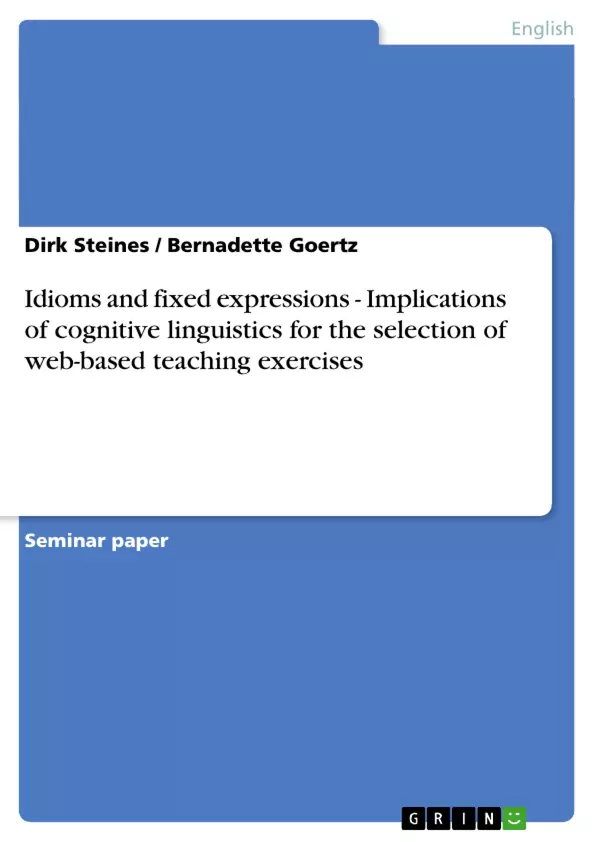Idioms are an important factor in native-like discourse by an English as a foreign language (EFL) speaker. According to Fernando (1996) “the sheer number of idioms and their high frequency in discourse make them an important aspect of vocabulary acquisition and language learning in general”. Many linguists claim that idioms require special attention in language programs and should not be relegated to a position of secondary importance in the curriculum.
However, classroom learning of EFL is - at least in Germany - not very concerned with the teaching of idioms and fixed expressions, as analyses from current and historical textbooks have shown. This results in the necessity for the teacher to make up own exercises or series of lessons to put the teaching of fixed expressions into the curriculum. The cognitive approach to language learning provides useful aspects and implications on how to organize idiom learning in a classroom context.
The aim of our paper is to use the cognitive linguistics approach towards idioms and other fixed expressions in English to analyse different homepages on the World Wide Web. In order to do this we will first present a short survey of different cognitive approaches to idioms and their didactic implications for teaching exercises. We will then go on with an analysis of six websites with respect to how the content, structure and exercises follow the implications given by the presented cognitive approaches.
After a discussion of the positive and negative aspects we found on the web, we try to give a proposition on how an idiom learning website could be structured and how exercises could look like, when they try to follow a cognitive approach.
Inhaltsverzeichnis (Table of Contents)
- Introduction
- Theoretical approaches
- Transfer in idiom learning
- Cognitive semantics and the arrangement of idiom dictionaries
- The scale of idiomaticity and the role of (conceptual) metaphors
- Teaching implications for collocations
- Analysis of current e-learning websites for idioms
- http://english-zone.com
- http://esl.about.com
- www.idiomconnection.com
- http://www.readwritethink.org/materials/idioms
- http://a4esl.org/q/h/idioms.html
- www.akademie.de/fuehrung-organisation/management/kurse/englische-korrespondenz/erfolgskontrolle/idioms-test.html
- Summary and outlook
- Conclusion
Zielsetzung und Themenschwerpunkte (Objectives and Key Themes)
This paper aims to analyze different homepages on the World Wide Web using the cognitive linguistics approach towards idioms and other fixed expressions in English. The analysis will first present a brief survey of different cognitive approaches to idioms and their didactic implications for teaching exercises. The paper will then examine six websites with respect to how their content, structure and exercises align with the implications given by the presented cognitive approaches.
- Cognitive linguistics approach to idioms and fixed expressions
- Didactic implications for teaching idioms
- Analysis of web-based teaching materials
- Evaluation of websites based on cognitive principles
- Proposition for structuring an idiom learning website
Zusammenfassung der Kapitel (Chapter Summaries)
The introduction highlights the importance of idioms for native-like discourse by EFL speakers and the lack of focus on idiom teaching in EFL classrooms, especially in Germany. The paper aims to bridge this gap by applying cognitive linguistics principles to the analysis of web-based idiom learning materials.
Chapter 2 presents theoretical approaches to idiom learning, focusing on transfer, cognitive semantics, the scale of idiomaticity, and teaching implications for collocations. The chapter emphasizes the role of cognitive linguistics in understanding idiom learning and how it can inform the design of effective teaching materials.
Chapter 3 analyzes six current e-learning websites for idioms, evaluating their content, structure, and exercises based on the theoretical framework presented in Chapter 2. The chapter highlights both positive and negative aspects of these websites, highlighting opportunities for improvement.
Chapter 4 summarizes the findings of the website analysis and offers a proposition for how an idiom learning website could be structured and how exercises could be designed to effectively utilize a cognitive approach.
Schlüsselwörter (Keywords)
This paper examines the cognitive linguistics approach to idioms and fixed expressions in English, focusing on the implications for teaching materials. The analysis explores transfer in idiom learning, cognitive semantics, the scale of idiomaticity, and the role of conceptual metaphors. It also evaluates current e-learning websites for idioms and proposes guidelines for designing effective web-based teaching materials.
Frequently Asked Questions
Why are idioms important for EFL learners?
Idioms are essential for achieving native-like discourse, as their high frequency in daily language makes them a vital part of vocabulary acquisition.
What is the focus of the cognitive linguistics approach in this paper?
The paper uses cognitive linguistics to analyze how web-based exercises and websites structure the teaching of idioms and fixed expressions.
What problem does the paper identify in German EFL classrooms?
Current and historical textbooks in Germany often neglect the teaching of idioms, forcing teachers to create their own materials.
Which websites were analyzed in this study?
The study analyzed six websites, including english-zone.com, esl.about.com, and idiomconnection.com, among others.
What are conceptual metaphors in the context of idiom learning?
Conceptual metaphors are part of the cognitive approach that helps learners understand the underlying logic and scale of idiomaticity.
What is the final goal of this research?
The goal is to propose a structure for an ideal idiom-learning website based on cognitive linguistic principles.
- Quote paper
- Diplom Sportwissenschaftler Dirk Steines (Author), Bernadette Goertz (Author), 2006, Idioms and fixed expressions - Implications of cognitive linguistics for the selection of web-based teaching exercises, Munich, GRIN Verlag, https://www.hausarbeiten.de/document/74500


